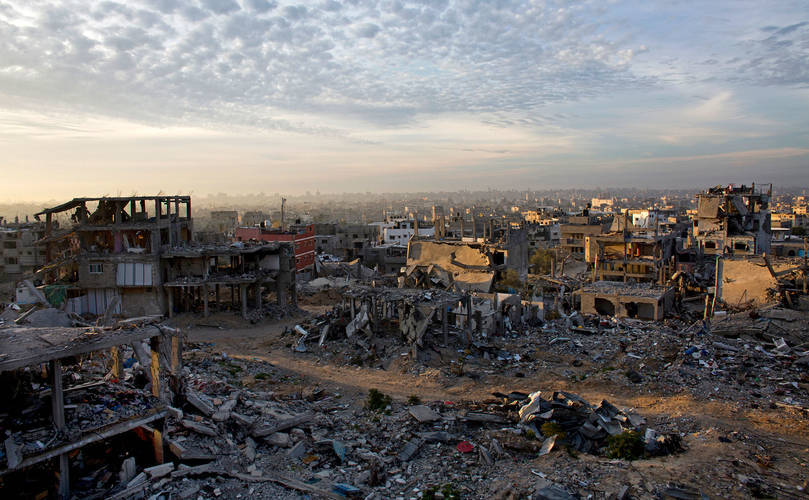The demand for Arabic content online is skyrocketing. In the Middle East alone, the Internet usage rose by an impressive 4,374.3 percent between 2000 and 2017, making Arabic one of the fastest growing languages online.
This has naturally created opportunities for more Arabic content — projects are springing up in Cairo, Amman, Riyadh and even the Gaza Strip, a place where economic opportunities are few and far, and approximately 70 percent of the population relies on humanitarian assistance.
Israel imposed movement restrictions on the 140 square mile patch of land in the early 1990s and intensified them in 2007 when Hamas, the democratically empowered Islamic group considered a terrorist organization by many countries, took control of the territory.
Since then, Gaza has been under a land, sea, and air blockade. Human Rights Watch (HRW) has called it “an unlawful act of collective punishment.”
Israel has been citing security concerns as the reason for “locking in” nearly two million people and denying them free access to the remainder of the territory and the outside world.
Gaza’s other neighbor, Egypt, has also imposed restrictions on Rafah, it’s only single passengers crossing.
The most recent report by HRW about the conflict zone has said that the decade-long closure of Gaza is perpetuating poverty by limiting the supply of electricity and water, while also restricting access to medical care, educational and economic opportunity.
However, even in a land that is completely under siege, people have found a way to export one thing that can’t be restricted – information. Gaza’s first tech incubator, Gaza Sky Geeks nonprofit, is capitalizing on exactly this.
“The one piece of infrastructure that cannot be completely restricted is the Internet,” Mosab Ibrahim, a freelance copywriter and translator based in Gaza, told The Globe Post.
“Online work, whether it be building a software product, translations, graphic design, or just any sort of contracted online freelance work is all stuff people can do in Gaza, regardless of physical blockades.”
Gaza Sky Geeks was launched in 2011 by Mercy Corps charity with initial funding from Google. Today, it has 50-60 people working for it. The company is equipping young Gaza residents with technical skills and resources to participate in the digital economy, a valid alternative as the real economy crumbles.
Hani Mortaja, who has been working as a Data and Operations Offer at Gaza Sky Geeks for the past four years, was recently offered an internship in TQ, a curated tech hub in Amsterdam.
Only 1 percent of Gazans can successfully leave the city each year, when the Rafah borders opens for a few days.
Mr. Mortaja had to wait seven months to have his name listed for travel. Then he spent two days waiting to be processed at Rafah on the Egyptian border, followed by a twelve-hour bus ride to Cairo, before he could take a flight to Amsterdam.
“My internship was for six weeks but the borders are still closed, so I can’t fly back,“ Mr. Mortaja told The Globe Post. “My visa is valid for a while and I am waiting for the borders to open so I can go back home and give back to Gaza by implementing new projects from what I am learning here.”
He is currently undertaking an intensive community management internship with TQ and also collaborating with other tech hubs across Europe. Mr. Mortaja plans to use the retained expertise to improve Gaza Sky Geeks.
“We believe that the digital economy in West Bank and Gaza has a strong growth potential. Digital technologies allow software developers and knowledge workers to overcome physical barriers and deliver real-time services to clients everywhere in the world,” Ashraf Saad Allah Al-Saeed, a spokesperson for the World Bank, told The Globe Post.
Just in the past two years, at least 100 people, generally in teams of two to three entrepreneurs, have gone through the GSG’s incubator to develop viable start-ups.
“The trend to freelance here is growing steadily, and hundreds of people are entering and supporting the workforce of Gaza,” Ahmad Shalabi, a Palestinian lean business development adviser, told The Globe Post.
Mr. Shalabi has been working with several INGO’s and CBO’s like Mercy Corps and Oxfam in finding solutions to unemployment.
“We’re an entire generation who has been completely confined and never interacted with people outside Gaza,” Mr. Ibrahim said.
Today In Palestine: Stories you might have missed
– Debt lands hundreds of Gazans in jail as economy tanks
– Jerusalemites perform Friday prayers outdoors to protest Israel’s policies
Those stories and more in today's round-up.https://t.co/9kflEk1bep#TodayInPalestine #Israel— Mondoweiss (@Mondoweiss) March 13, 2018
Unemployment for Gaza’s young adults – who make up more than two-thirds of the population – hovers around 60 percent, according to the World Bank.
But the freelancing culture is rising steadily, said Mr. Shalabi, who is also a program coordinator for another tech incubator in Palestine, PICTI.
“It started in 2010, after the Israeli war on Gaza, but especially grew around 2013, after Mercy Corps started focusing on increasing the awareness of this source of income and how it may provide a solution for many graduates from many specializations,” Mr. Shalabi said.
There are now three active training programs that work on building freelancers’ capacity and training them in handling and overcoming all sorts of problems.
While the attempt to build a modern economy in one of the biggest conflict zones in the world may seem quixotic, in some ways, it is rather practical. For instance, there is no shortage of funding for humanitarian relief, and there is a massive multiplier effect.
According to Mr. Shalabi, freelancers are building their own fuzz economy that works.
“Many of them, after reaching a steady income, establish their own firms and hire other graduates,” he said.
And it is not that difficult to find a fellow graduate – the literacy rate in Gaza is 96.8 percent.
One firm that came out of Gaza Sky Geeks is Baskalet, a mobile game studio that targets Arabic speakers, which has seen its games downloaded a million times.
There are still significant challenges though. On bad days, it is the shelling.
Over the past ten years, Gaza has endured three wars between Israel and Hamas and a civil war between Hamas and Fatah, the secular Palestinian political party that rules the West Bank.
On the better days, the area is hamstrung by other issues – fluctuating electricity, for example.
“The problem of electricity shortage directly affects the economic sector and impedes any real progress and growth in most directions,” Mr. Shalabi said.
Another major challenge is payments: getting money in and out of the strip can require circuitous routes via friends abroad.
Palestinian freelancers and digital entrepreneurs have long been advocating for more digital payment options. PayPal, for instance, hasn’t been receptive.
“Israeli settlers in the West Bank have access to PayPal but a Palestinian living literally next door doesn’t,” Mr. Ibrahim explained.
The broadband infrastructure is also constrained due to Israeli restrictions on access to the Palestinian electromagnetic sphere (EMS), as well many devices that enhance network performances.
These delays have high economic costs. According to 2016 World Bank estimates, over the previous three years, the total accumulated revenue from the Palestinian mobile sector could have been more than $1 billion higher, if the restrictions on just this sector alone had been lifted.
The associated fiscal losses of the Palestinian Authority (for the same period) were estimated at $184 million, counting non-collected value-added tax alone. This amount equals up to 3 percent of the country’s GDP.
“Lowering the cost and increasing the overall internet speed in West Bank and Gaza can boost youth employment and empower many Palestinians to have significant opportunities related to the emerging digital economy,” Mr. Al-Saeed said.
“The constraints are particularly acute in Gaza, where the development of the software industry is limited by additional restrictions to the import of equipment.”
West Bank was the last in the MENA region to introduce 3G mobile services. At the time when other countries have been moving to 4G, 5G, and Ultra-Fast Broadband (UFB), Gaza is still operating on 2.5G.
“The ICT sector in West Bank is now working directly with Israeli IT firms and has seen great progress already,” Mr. Shalabi said. “However, Gaza cannot communicate with any firms from the West Bank, due to the siege and so the only solution is to communicate directly with international possible partners – freelancing, that is.”
In terms of unemployment, incubators like Gaza Sky Geeks and PICTI are doing their best to support Palestine’s tech ecosystem.
They regularly conduct researches on which types of jobs have the highest demand and then lead training programs based on where the market is going and where the jobs are. They are also committed to preserving diversity and inclusion. Gaza Sky Geeks, for instance, has a Women’s Inclusivity Program Manager.
The results are quite impressive, with women making up 43 percent of the freelancers, coders, and entrepreneurs – a much better result compared to global statistics, where women keep only ten percent of such jobs.
“The development of digital platforms for employment and the empowerment of Palestinian professionals is, therefore, the key to creating employment among women and youth in Palestine,” Mr. Al-Saeed said.
And with little to no signs that political resolution of the conflict is near, the digital economy may currently be the only viable choice for people seeking opportunity in Gaza.
“As long as the internet is up, it doesn’t really matter if the borders are closed,” Mr. Ibrahim said. “You can still work in a global marketplace.”





















